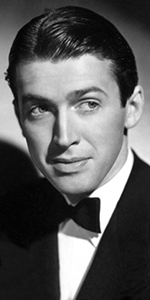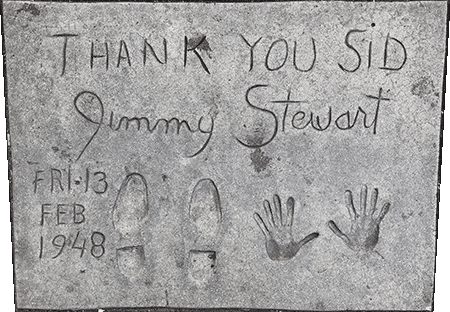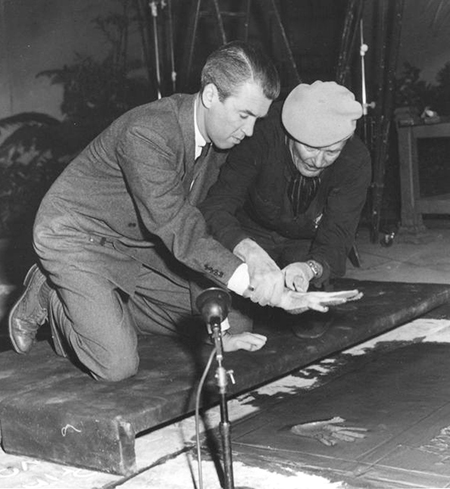 |
 |
 |
 |
 |
| James Stewart, date unknown. |
| |
|
 |
|
| |
| |
| |
| |
|
|
| James Stewart
|
 |
| Forecourt Ceremony held on Friday, February 13, 1948 |
| |
Born: May 20, 1908, in Indiana, Pennsylvania
Age at the time of the ceremony: 39
Died:
July 2, 1997, in Beverly Hills, California, age 89 |
| |
James Stewart is another cinema legend. Tall and gangly, with an unmistakable voice and manner, Stewart seemed to embody the attitudes of many Americans during the 1930s, 40s and 50s. In him, we still see ourselves.
Born to a hardward store-owning father and piano-playing mother, James did not want to take over the hardware store and was discouraged from the piano by his dad. Taking up the accordian (!), Stewart continued to play the instrument for the rest of his life.
Attending the Mercersburg Academy prep school, he graduated in 1928, and was involved in all the campus activities; a shy, but very well-rounded young man.
He dreamed of becoming a pilot.
At his father's insistance, James attended Princeton, where his master's thesis in architecture was for an airport. But the call of the stage led him to join the University Players, a summer stock company on Cape Cod in 1932, where he shared an apartment with Henry Fonda and Joshua Logan.
Although he broke into Broadway shows with Carry Nation in 1932, and Goodbye Again in 1933, Stewart found weathering the Depression as an actor in New York difficult, but his appreance in Divided by Three caught the attention of M-G-M scout Bill Grady; Stewart was hired as a contract player in 1935.
Arriving in Hollywood, Stewart and Fonda shared an apartment again, with Fonda's ex, Margaret Sullavan insisting on Stewart for her film Next Time We Love (released in January 1936). This hooked him up with Sullavan's next husband, agent Leland Hayward, who hit on the idea of loaning Stewart out to other studios, since M-G-M didn't seem to know what to do with him.
Over at Columbia, director Frank Capra saw Stewart in Navy Blue and Gold (which played the Chinese in November 1937), and put him in the ensemble cast of his film of You Can't Take It with You (released in September 1938), which finally made Stewart a star. The following year, Stewart gave a truly great performance in what still remains a hugely
entertaining film: Mr. Smith Goes to Washington (released in October 1939).
Stewart was now in high demand. He starred in Destry Rides Again (released in December 1939), The Shop Around the Corner (which played the Chinese in Janaury 1940), The Mortal Storm (released in June 1940) and most importantly, The Philadelphia Story (which palyed the Chinese New Year's Eve 1940 and January 1941 and for which he was awarded the Best Actor Oscar). With the ending of his M-G-M contract, Stewart joined the Army in March 1941.
Already an experienced pilot, Stewart wanted to fly combat missions, but was considered to old and too prominent for this; he became a training instructor, eventually training crews in the B-17 Flying Fortress out of Boise Idaho. He became the commander of the 403rd Bombardment Squadron. In December 1943, Stewart led his squadron on several attacks on militray targets in Germany, followed by more missions during "Big Week" in February 1944. In March, he flew in a bombing raid on Berlin itself. Always opting for practical leadership over executive inaction, Stewart racked up 20 sorties, and won the Distinguished Flying Cross.
After the war, Stewart joined fellow serviceman Frank Capra and starred in It's a Wonderful Life (released in December 1946). Now considered a holiday classic, Life did only moderate business, causing Stewart to reconsider his acting vocation. He starred in a string of flops before assuming the role of Elwood P. Dowd from Frank Fay in the Broadway production of Harvey. He did the play starting in July 1947, and left it later that year.
Returning to Hollywood, Stewart decided to take a risky turn: Westerns. Winchester '73 (released in July 1950) and Broken Arrow (which played the Chinese in August 1950), were both huge hits. Stewart then starred in the film adaptation of Harvey (released in December 1950). A busy guy.
Later Stewart greats include The Greatest Show on Earth (released in May 1952), Rear Window (released in September 1954), Strategic Air Command (released in March 1955 - Stewart was actually in the Command as a Brigadier General), Vertigo (released in May 1958), Anatomy of a Murder (released in July 1959), The Man Who Shot Liberty Valance (released in April 1962) and The Flight of the Phoenix (released in December 1965).
As part of his duties in the Air Force Reserve, he observed a bombing mission in Vietnam in February 1966. He retired from the Reserve in 1968.
He starred in a revival of Harvey on Broadway during the 1970 season. Stewart even starred in a couple of television shows: The Jimmy Stewart Show on NBC during the 1971-72 season, and Hawkins on CBS during the 1973-74 season.
He appeared with John Wayne in the Duke's last film, The Shootist (released in August 1976), and did the voice of Sheriff Wylie Burpin the animated film An American Tail: Fievel Goes West (released in November 1991). A failing heart condition required the installation of a pacemaker; when the battery needed to be replaced, Stewart opted for things to happen naturally. Thrombosis was followed by pulmonary embolism. He died at home, surrounded by his family. He was 89. |
|
|
|
|
| |
 |
 |
| Grauman's Chinese Theatre, Hollywood, California. James Stewart Forecourt block. Executed by Jean Klossner, Friday, February 13, 1948. 52 x 38 inches overall. |
 |
 |
 |
| Grauman's Chinese Theatre, Hollywood, California. James Stewart Forecourt ceremony, Friday, February 13, 1948. James Stewart assists cement artist Jean Klossner as they make an impression of Stewart's hand in the cement. |
|
|